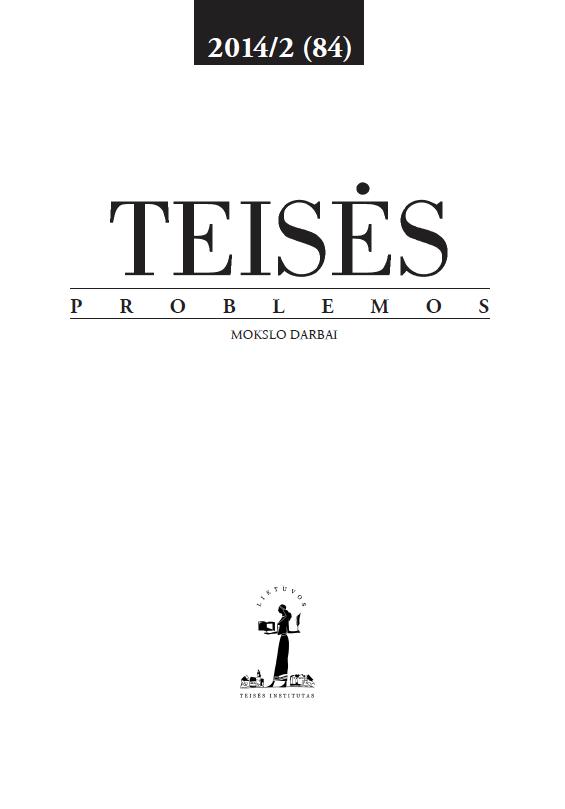Europos Sąjungos ekonominė konstitucija kaip papildoma Lietuvos Respublikos Konstitucijos dimensija: tyrimų kontūrai
THE EUROPEAN UNION ECONOMIC CONSTITUTION AS THE ADDITIONAL DIMENSION OF THE CONSTITUTION OF THE REPUBLIC OF LITHUANIA: CONTOURS OF THE RESEARCH
Author(s): Irmantas JarukaitisSubject(s): Law, Constitution, Jurisprudence, Supranational / Global Economy, Law on Economics, EU-Legislation
Published by: Lietuvos teisės institutas
Summary/Abstract: The article deals with the notion of the economic constitution, the content of the economic constitution of the Republic of Lithuania, of the European Union and the interrelationship between the two. The first part of the article, relying, among the other things, on the thoughts of the ordoliberal school, is devoted to analysis of the concept of the economic constitution. It describes the reasons, why certain core principles concerning of the organization of the economic system of the political community should form part of the constitutional rules of that community, how they should be defined in order to ensure the optimal frame of the economic system. Arguments are provided that although in the market economy everyday decisions should be made by economic operators instead of state institutions, some core principles ensuring „rules of the game“, for example, imperatives concerning protection of the competitive process, should be established at the constitutional level. Further the Constitution of the Republic of Lithuania is analyzed from that perspective. The main emphasis is placed on analysis of Article 46 of the Constitution and the jurisprudence of the Constitutional Court. Various functions performed by Article 46 are highlighted: serving as a systemic decision concerning organization of economic system of the state (establishing the constitutional imperative of namely the market oriented economy), establishing an individual (subjective) constitutional freedom to conduct a business as well as establishing various constitutional imperatives for state institutions as regards the governance of the economic system of the state. Analysis of the jurisprudence of the Constitutional Court revealing the Court‘s stance as regards protection of the freedom to conduct business and its attitude towards powers of political institutions as regards the intervention in the market are provided. Part two of the Article is devoted to the basic aspects of the economic constitution of the European Union. First of all, systemic orientation towards market economy of the primary EU law, taking into account developments of the Lisbon Treaty, is highlighted. It is argued that although the Lisbon Treaty accommodates more socially oriented language, this development fundamentally does not affect the systemic orientation towards the market economy. Further, legal guaranties supporting that systemic orientation (namely, subjective fundamental economic freedoms of the internal market, the EU competition rules) and their functions within overall architecture of the EU legal system are described. It is argued that they perform integratory function, expand the autonomy of individuals and have a big impact on discretion of the Member States to make various decisions. Finally part two of the Article deals with the public powers of formation and implementation of the economic policy that are transferred to the supranational level, the vertical redistribution of powers between national and supranational levels, the impact of such redistribution on the discretion that the Member States maintain in that field. Analysis reveals that although EU primary law does not establish overall competence of the EU institutions to form and implement economic policies, it nevertheless limits in various ways the powers of the Member State to shape their economic policies. Part three of the article deals with the interrelationship between the Constitution of the Republic of Lithuania and EU primary law in the field of economic relations. It points to the structural compatibility between the national constitution and EU law as regards basic (systemic) decisions in favour of the market economy and reveals that legal guaranties provided by EU primary law supplement those established in the national constitution thus strengthening autonomy of the individual and limiting the powers of national institutions. It argues as well that provisions of the Constitution should be interpreted in the light of EU primary law, since in some respects the material content of the Constitution is de facto enriched by EU law, the EU competition law being the most obvious example. Based on the research conclusions are provided in the part four of the Article.
Journal: Teisės problemos
- Issue Year: 2014
- Issue No: 84 (2)
- Page Range: 26-99
- Page Count: 74
- Language: Lithuanian

